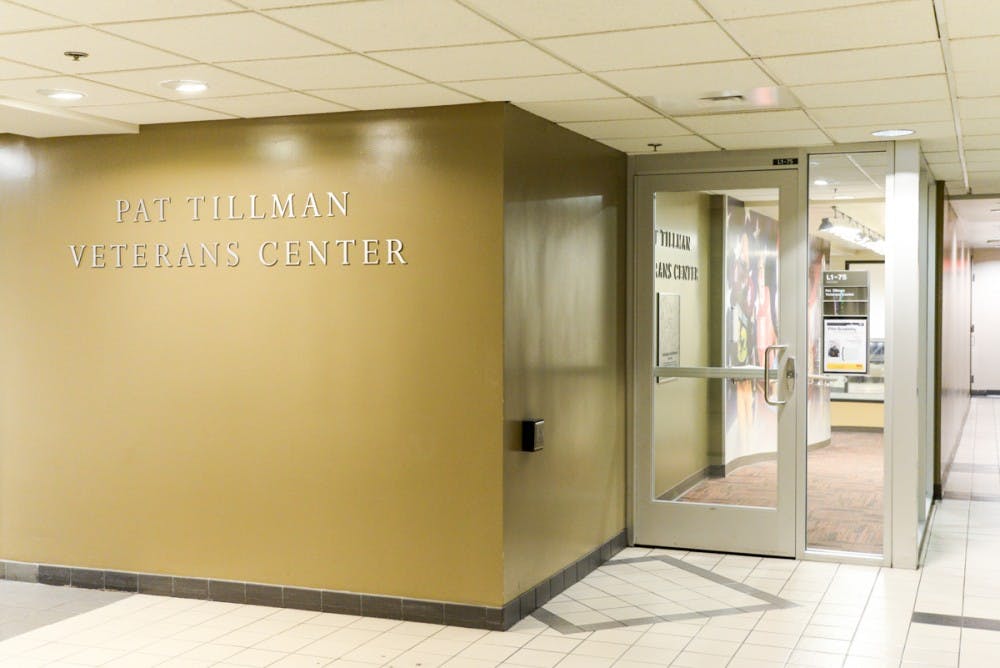 The Pat Tillman Veterans Center, located on the Lower Level of the Memorial Union, provides services to U.S. veterans and their dependents attending ASU. (Jennifer Bauer-Leffler/The State Press)
The Pat Tillman Veterans Center, located on the Lower Level of the Memorial Union, provides services to U.S. veterans and their dependents attending ASU. (Jennifer Bauer-Leffler/The State Press)
A new office for ASU veterans is making the transition from military life to student life easier, while allowing veterans to benefit classmates with their life experiences.
Working with academic departments from all areas at ASU, history professor Mark von Hagen started the Office for Veteran Military Academic Engagement two years ago, in coordination with the Pat Tillman Veterans Center. It wasn't until last semester the office started to make an impact, he said.
"It is mainly a group of faculty who are in one way or another listening to veterans' stories," von Hagen said. "Whether for theater, for history, sociology, psychology, social work even, a lot of people listen to stories, and particularly veterans' stories, and either use it in their research or their teaching."
While the Pat Tillman Veterans Center works as a one-stop advising center for veteran students, the new office works to integrate veterans at a different level, into departments, schools and colleges, von Hagen said.
"We are trying to find ways to help veterans express what it is they want to tell us about their experiences," he said. "Some may not be ready, and since veterans are so different, like everybody, we are not trying to have a one-size-fit-all."
The office encourages professors in all parts of campus to use veterans in whatever way fits their lessons.
"I have a course that is called Wartime Occupations and Colonial Wars, and I have a guy who is coming to speak named Fahim Fazli who is going to be in 'American Sniper,'" von Hagen said.
The office also works to bring veterans together in new ways to study arts and humanities, Von Hagen said.
A group of about a dozen to 15 veterans met at the Phoenix Library for five weeks to discuss works of literature involving wartime narratives such as Stephen Crane on the Civil War, Ernest Hemingway and World War I and J.D. Salinger and World War II, von Hagen said. An ASU alumnus and a Ph.D of English from ASU facilitated the meeting.
The use of veterans in the classroom can put a face to stories being learned and help humanize the events of the past. However, von Hagen said veterans are not being forced to speak in any classes. Rather, they are encouraged to tell their stories if they want to, he said.
Nancy Dallett, assistant to the director of the Office for Veteran Military Academic Engagement, said her hope is that in the long term both veterans and non-veterans will have a better sense of how to engage with one another and understand military culture.
"I hope they find ways to communicate better, not to be afraid of one another and to really just understand each others' different experiences," she said.
Breaking down barriers between civilians, universities and veterans is what the office hopes to accomplish, Dallett said.
"It’s kind of a two-way street," she said. "It’s not just for the veterans exclusively, to help them in their academic engagement, but also to help the general student population, staff and faculty, so we can all be contributing to that communication and veteran success."
 The hall-length mural at the entrance to the Pat Tillman Veterans Center depicts ASU hero Pat Tillman on the field, in the classroom and in uniform. The Office for Veteran Military Academic Engagement, in conjunction with the Veterans Center, is trying to bring veterans into the classroom. (Jennifer Bauer-Leffler/The State Press)
The hall-length mural at the entrance to the Pat Tillman Veterans Center depicts ASU hero Pat Tillman on the field, in the classroom and in uniform. The Office for Veteran Military Academic Engagement, in conjunction with the Veterans Center, is trying to bring veterans into the classroom. (Jennifer Bauer-Leffler/The State Press)
Dallett said many veterans bring a service-minded nature to their education from the military, and the project provides them a great opportunity to engage in discussion about the nature of conflict and service.
The arts and humanities are the main avenues the office is using to offer opportunities to get veterans to engage.
"We are offering different opportunities through music, films, writing and reading, and as of now those are our main avenues of involvement," she said.
Capt. Steven Borden, Pat Tillman Veterans Center director, said the name of the office says it all when describing what they are trying to achieve.
"It’s an opportunity for veterans to feel like they are better engaged in the academic community," Borden said. "Meaning there is a better understanding of veterans, not only how to navigate the academic environment, but what is inside the academic environment that may be most beneficial to them."
The office also creates opportunities for ASU to be enriched by the experiences veterans bring to the University.
von Hagen said the ultimate goal for the office is to be a center for military history, and the history of wars and peace.
"The office is about reminding us what living with war means," he said. "Since we’ve been at war for a long time, and it looks like we will be at war for the foreseeable future. ... We should learn as much about those wars as possible and the best way is by the people who were there."
Reach the reporter at jshanco2@asu.edu or follow @joey_hancock on Twitter.
Like The State Press on Facebook and follow @statepress on Twitter.




